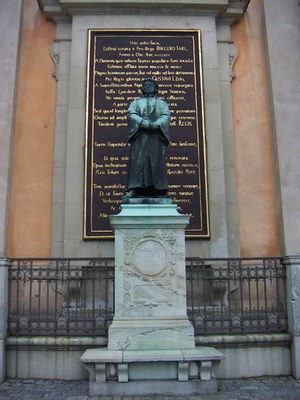Olaus Petri (1493–1552)

Olaus Petri was a central figure in the implementation of the Reformation in Sweden. As the first Swedish pupil of Luther, he returned to Sweden from Wittenberg University in 1518 and won Laurentius Andreae – who along with Olaus Petri and his brother Laurentius Petri is regarded as the foremost reformer of Sweden – over to the cause of the Reformation. Olaus Petri wrote polemical texts against the Mass, celibacy, the cult of the saints and monastic life, and he published a Mass and a liturgy in Swedish. In Petri's writings from the 1520s, Martin Luther is identified as the theological authority on which the Swedish Reformation is based. However, influences from the south-western German Reformation – transferred via connections with Prussia – were also conspicuous in his theology. In his early writings, his position on the Eucharist was close to the theology of Ulrich Zwingli.
Teodor Lundberg (1852–1926), Statue of Olaus Petri (1493–1552) beside the Storkyrka in Stockholm, erected in 1898, colour photograph 2005, photographer: Peter Isotalo; source: Wikimedia Commons, http://commons.wikimedia.org/wiki/File:Storkyrkan2.jpg?uselang=de.
 Creative Commons-Lizenz Namensnennung-Weitergabe unter gleichen Bedingungen 3.0 Unported.
Creative Commons-Lizenz Namensnennung-Weitergabe unter gleichen Bedingungen 3.0 Unported.